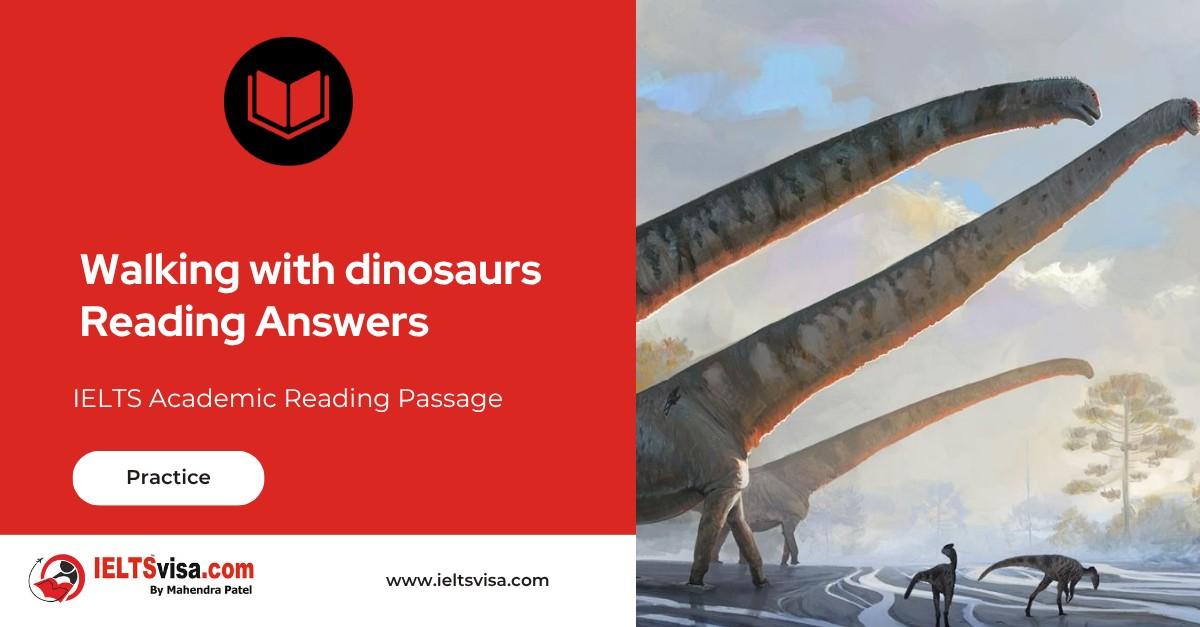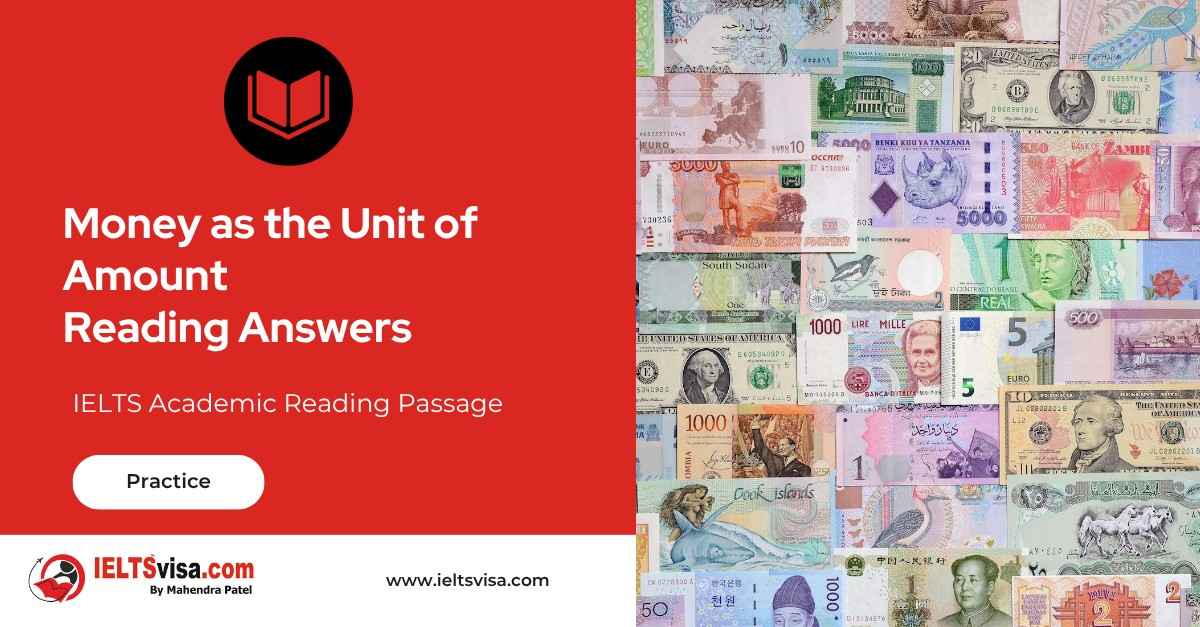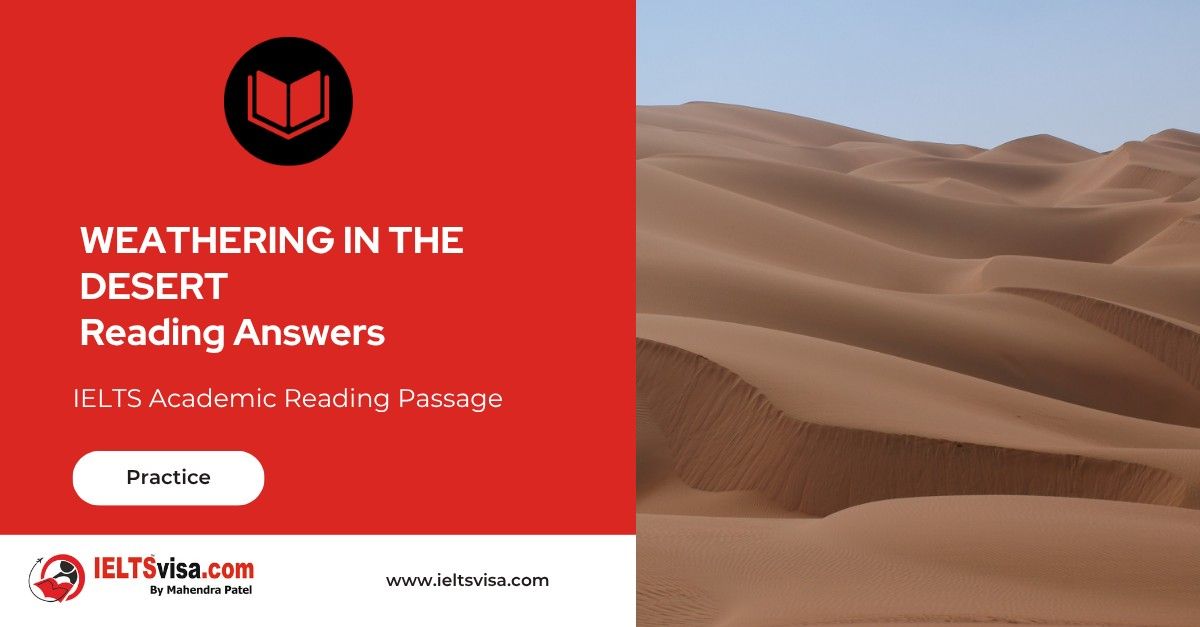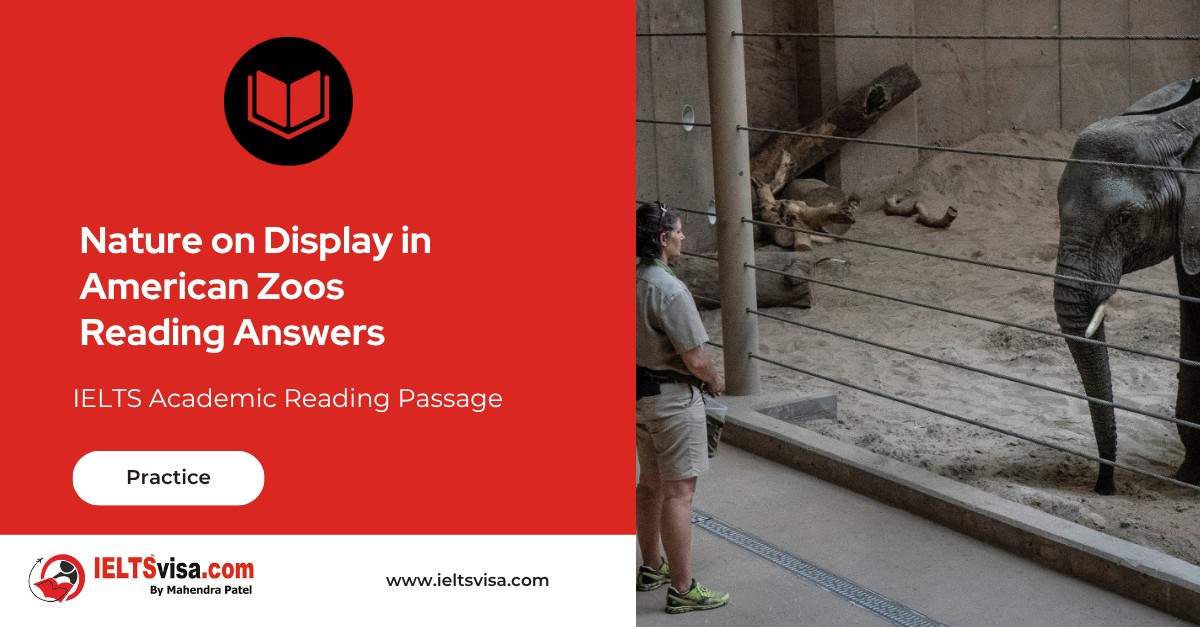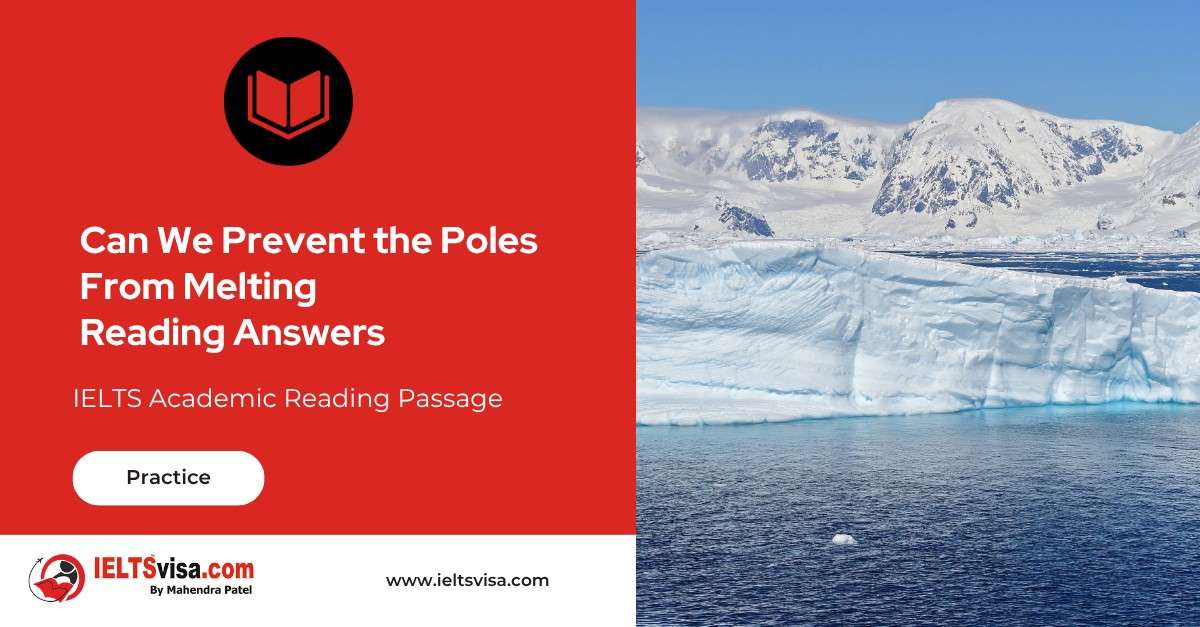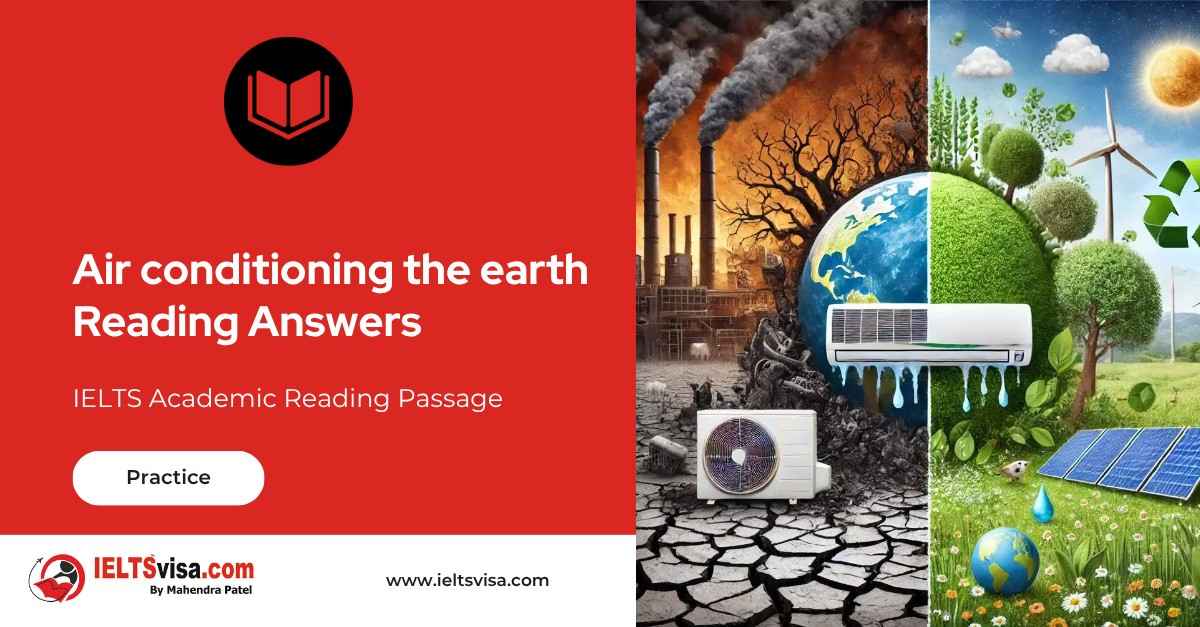A Library at your Fingertips Reading Answers
IELTS Academic Reading Passage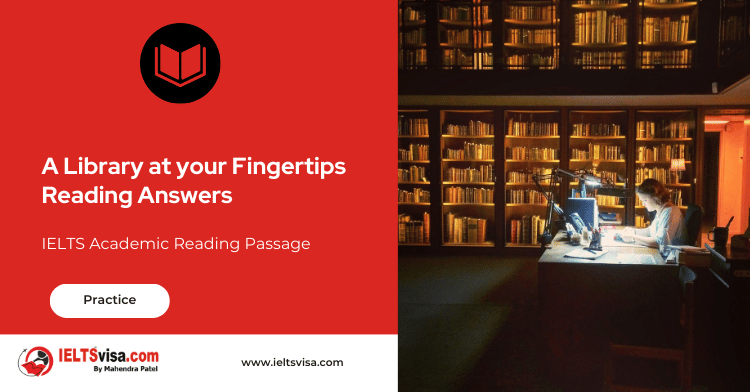
A few years ago, at the height of the dotcom boom, it was widely assumed that a publishing revolution, in which the printed word would be supplanted by the computer screen, was just around the corner. It wasn’t: for many, there is still little to match the joy of cracking the spine of a good book and settling down for an hour or two of reading. A recent flurry of activity by big technology companies – including Google, Amazon, Microsoft and Yahoo! – suggests that the dream of bringing books online is still very much alive.
The digitising of thousands of volumes of print is not without controversy. On Thursday, November 3, Google, the world’s most popular search engine, posted a first instalment of books on Google Print, an initiative first mooted a year ago. This collaborative effort between Google and several of the world’s leading research libraries aims to make many thousands of books available to be searched and read online free of charge. Although the books included so far are not covered by copyright, the plan has attracted the ire of publishers.
Five large book firms are suing Google for violating copyright on material that it has scanned and, although out of print, is still protected by law. Google has said that it will only publish short extracts from material under copyright unless given express permission to publish more, but publishers are unconvinced. Ironically, many publishers are collaborating with Google on a separate venture, Google Print Publisher, which aims to give readers an online taste of books that are commercially available. The searchable collection of extracts and book information is intended to tempt readers to buy the complete books online or in print form.
Not to be outdone, Amazon, the world’s largest online retailer, has unveiled plans for its own foray into the mass e-book market. The firm, which began ten years ago as an online book retailer, now sells a vast array of goods. No doubt piqued that Google, a relative newcomer, should impinge upon its central territory, Amazon revealed on Thursday that it would introduce two new services. Amazon Pages will allow customers to search for key terms in selected books and then buy and read online whatever part they wish, from individual pages to chapters or complete works. Amazon Upgrade will give customers online access to books they have already purchased as hard copies. Customers are likely to have to pay around five cents a page, with the bulk going to the publisher.
Microsoft, too, has joined the online-book bandwagon. At the end of October, the software giant said it would spend around $200 million to digitise texts, starting with 150,000 that are in the public domain, to avoid legal problems. It will do so in collaboration with the Open Content Alliance, a consortium of libraries and universities. (Yahoo! has pledged to make 18,000 books available online in conjunction with the same organisation.) On Thursday, coincidentally the same day as Google and Amazon announced their initiatives, Microsoft released details of a deal with the British Library, the country’s main reference library, to digitise some 25 million pages; these will be made available through MSN Book Search, which will be launched next year.
These companies are hoping for a return to the levels of interest in e-books seen when Stephen King, a best-selling horror writer, published “Riding the Bullet” exclusively on the Internet in 2000. Half a million copies were downloaded in the first 48 hours after publication. This proved to be a high-water mark rather than a taste of things to come. While buyers were reluctant to sit in front of a computer screen to read the latest novels, dedicated e-book reading gadgets failed to catch on. Barnes and Noble, a leading American bookshop chain, began selling e-books with fanfare in 2000 but quietly pulled the plug in 2003 as interest faded.
The market for e-books is growing again, though from a tiny base. According to the International Digital Publishing Forum, which collates figures from many of the world’s top publishers, in the third quarter of 2004, worldwide sales were 25% higher than the year before. Unfortunately, this only amounted to a paltry $3.2 million split between 23 publishers in an industry that made sales worth over $100 billion that year.
Both retailers and publishers reckon they will eventually be able to persuade consumers to do a lot more of their reading on the web. Some even hope they can become to online books what Apple’s iTunes is to online music. There are crucial differences between downloading fiction and downloading funk. Online music was driven from the bottom up: illegal filesharing services became wildly popular, and legal firms later took over when the pirates were forced (by a wave of lawsuits) to retreat; the legal providers are confident that more and more consumers will pay small sums for music rather than remain beyond the law. The iPod music player and its like have proved a fashionable and popular new way to listen to songs. The book world has no equivalent.
So the commercial prospects for sellers of online books do not yet look very bright. They may get a lift from some novel innovations. The ability to download mere parts of books could help, for instance: sections of manuals, textbooks or cookery books may tempt some customers; students may wish to download the relevant sections of course books; or readers may want a taste of a book that they subsequently buy in hard copy. The ability to download reading matter onto increasingly ubiquitous hand-held electronic devices and 3G phones may further encourage uptake. In Japan, the value of e-books (mainly manga comic books) delivered to mobile phones has jumped, though it will be worth only around ¥6 billion ($51 million) in 2005, according to estimates.
Questions 1 – 4
For each question, only ONE of the choices is correct. Write the corresponding letter in the appropriate box on your answer sheet.
1) A few years ago, it was widely thought that
A. people would read fewer ‘paper’ books.
B. companies like Amazon would go bankrupt.
C. the dotcom boom would soon end.
2) Publishers are unhappy with Google because
A. Google is only publishing extracts, not complete books.
B. they think Google is in breach of copyright.
C. Google is co-operating with leading research libraries.
3) Amazon will
A. sell books that previously only Google sold online.
B. buy the copyright for many books it sells online.
C. allow people to buy only parts that they want to read from books.
4) It is clear that most readers, if given the choice, prefer
A. ‘paper’ books.
B. reading from computer screens.
C. using dedicated e-book readers.
Questions 5 – 9
Complete the following sentences using NO MORE THAN THREE WORDS from the text for each gap.
5) If companies publish books online that are not covered by copyright, they avoid _______________.
6) The _________________ is very small but getting larger.
7) The ______________ expect that they will be able to convince more people to read online.
8) The _____________ has nothing similar to an iPod.
9) In Japan, most of the publications sent to mobile phones are _________________.
Questions 10 – 14
Do the statements on the next page agree with the information given in Reading Passage? In boxes 10 – 14 on your answer sheet, write
TRUE if the information in the text agrees with the statement
FALSE if the information in the text contradicts with the statement
NOT GIVEN if there is no information on this
10) Books that are out of print are not covered by copyright law.
11) Amazon began by selling books online.
12) Microsoft signed a deal with the British Library on the same day as Google and Amazon made their announcements.
13) Barnes and Noble published Riding the Bullet online.
14) The ability to sample a book online before buying it might help sales.

Solution For: A Library at your Fingertips
Reading Answers
| 1 – A | 8 – book world |
| 2 – B | 9 – manga comic books |
| 3 – C | 10 – FALSE |
| 4 – A | 11 – TRUE |
| 5 – legal problems | 12 – FALSE |
| 6 – market for e-books | 13 – FALSE |
| 7 – retailers and publishers | 14 – TRUE |
Review and Practice
- Regularly practice with IELTS reading samples and time yourself to get used to the pressure of the exam.
- Review your mistakes to understand where you went wrong and how to avoid similar errors in the future.
Our Books
Master IELTS Speaking Part 1
IELTS Writing Task 1 Book
IELTS Writing Task 2 Book
A Library at your Fingertips Reading Answers Explanation
Comin Soon
Practice IELTS Other Modules
IELTS Listening
The IELTS Listening test assesses how well you can understand spoken English in various contexts. It lasts about 30 minutes and is divided into four sections with a total of 40 questions. The listening tasks become increasingly difficult as the test progresses.
IELTS Academic Reading
The IELTS Academic Reading section assesses your ability to understand and interpret a variety of texts in academic settings. It is designed to evaluate a range of reading skills, including skimming for gist, reading for main ideas, reading for detail, understanding inferences, and recognizing a writer's opinions and arguments.
IELTS Speaking
The IELTS Speaking test assesses your ability to communicate in English on everyday topics. It lasts 11-14 minutes and consists of three parts: introduction, cue card, and a discussion based on the cue card topic.
IELTS General Reading
IELTS General Reading tests your ability to understand and interpret various types of texts. Here are some key areas and types of content you can expect to encounter in the reading section, along with tips for effective preparation.
IELTS Academic Writing Task 1
In IELTS Academic Writing Task 1, you are presented with a visual representation of information, such as graphs, charts, tables, or diagrams, and you are required to summarize, compare, or explain the data in your own words.
IELTS General Writing Task 1
In IELTS General Writing Task 1, you are required to write a letter based on a given situation. The letter can be formal, semi-formal, or informal, depending on the prompt. Here’s a breakdown of the key components to include in your letter
IELTS Academic Writing Task 2
In IELTS Academic Writing Task 2, you are required to write an essay in response to a question or topic. Here’s a guide to help you understand the essential elements of this task
IELTS Exam Tips
To succeed in the IELTS exam, practice regularly, familiarize yourself with the test format, improve your vocabulary, develop time management skills, and take mock tests to build confidence.
Grammer for IELTS
Grammar is the foundation of effective communication in English. Understanding tense usage, subject-verb agreement, and sentence structure enhances clarity and coherence in writing and speaking.
Vocabulary for IELTS
Vocabulary plays a crucial role in the IELTS (International English Language Testing System) exam, especially in the Speaking and Writing sections. Here’s an overview of why vocabulary is important and how it impacts your performance
RECENT IELTS SAMPLES QUESTIONS AND ANSWERS
Walking with dinosaurs
Peter L. Falkingham and his colleagues at Manchester University are developing techniques that...
Money as the Unit of Amount Reading Answers
The most difficult aspect of money to understand is its function as a unit of account. In...
WEATHERING IN THE DESERT
In the deserts, as elsewhere, rocks at the earth's surface are changed by weathering, which...
Nature on Display in American Zoos
The first zoo in the United States opened in Philadelphia in 1874, followed by the Cincinnati...
Can We Prevent the Poles From Melting
Such is our dependence on fossil fuels, and such is the volume of carbon dioxide we have...
Air conditioning the earth reading answers
The circulation of air in the atmosphere is activated by convection, the transference of heat...

